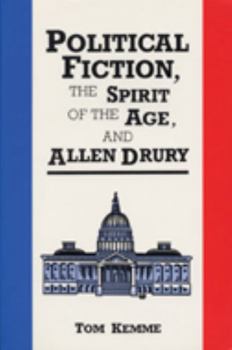Political Fiction, the Spirit of Age, and Allen Drury
Select Format
Select Condition 
Book Overview
The President of the United States, says the Constitution, cannot act in many specified instances without the "advice and consent" of Congress. But "advice" is not a strong word. And taking or not taking advice is a fairly nebulous situation . . . creating an instability, a fundamental ambiguity, at the very heart of power, between the Congress and the President. It is this instability, and this wide-openness, that allows the free play of the more intangible types of power that begin where the constitution breaks off: sex, personality, and character. Things which are left out of civics textbooks are what Allen Drury took as his subject in such novels as Advise and Consent, A Shade of Difference, and Capable of Honor.
Format:Paperback
Language:English
ISBN:0879723742
ISBN13:9780879723743
Release Date:January 1987
Publisher:University of Wisconsin Press
Length:258 Pages
Weight:0.85 lbs.
Dimensions:0.6" x 6.0" x 9.0"
Customer Reviews
1 rating
In-depth review of political fiction w/emphasis on Drury
Published by Thriftbooks.com User , 26 years ago
With the exception of an irritable typo of the name of the chief villain and the transposing of "Walter Wonderful"'s nickname, Kemme has done his homework well. He not only analyzed the philosophy (conservative) involved, but thje quality and character of each novel individually, as well as its relation to the entire set. Although I felt Drury was castigating the UN more than lauding it in shade of Difference, and that his satire in Capable of Honor was brilliant, most of Kemme's effort was exceptional. He recognized that the last 3 works did not measure up to the first 3. Was this a degree thesis? Well done. I'd like to see a revision of this book to include Drury's "University" trilogy in relation to the Advice and Consent sextet. The former seem less conservative and may reflect a change to philosophical pragmatism similar to Barry Goldwater's in his later years.






